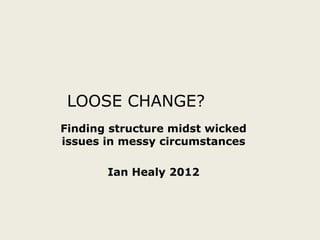
Week 2 loose change
- 1. LOOSE CHANGE? Finding structure midst wicked issues in messy circumstances Ian Healy 2012
- 2. Nostalgia Quote from the Ethics File Sep 24th, 2012 http://www.globalethics.org/newsline/2012/09/24/nostalgia/ “You can’t have a better tomorrow if you are thinking about yesterday all the time.” Charles Kettering quotes (U.S. inventor, engineer, and businessman, 1876-1958)
- 3. FRUSTRATION • “The trials and tribulations of wanting are born of frustration; to choose one thing may involve frustrating ourselves of something else.” {Phillips, 2012}. • Implications for learning and practice? • Implications for not knowing or initially understanding?
- 4. VERSIONS OF SELF OVER TIME • Past exists as a series of images-we recall these in order to negotiate present and future {Walther and Carey, 2009}. Past and present can as if coexist. Notion of stories that we tell about ourselves over time {White, 1990}. Some stories become more dominant than others.
- 5. HOW WE ‘STORY’ OURSELVES • Consider the versions of yourself that you might relate to others. Contexts? • What comes to be included versus what is excluded? What is emphasised versus downplayed? • How do you relate a version{s} of yourself now compared to a few years ago? • “I haven‟t changed a bit!”
- 6. COMPLEXITY OF SELF • Everyone in this room. • As learners in and out of this room. • Clients/service users/community members ditto. • Professionals, practitioners, experts etc ditto!
- 7. DIFFERENCE IS THE KEY • Not just between people but within each of us. • Swarms of difference {Deleuze, 1987}. • Such differences offer so much dynamic potential {White, 2008}. • Are differences always recognised? Convenient?
- 8. ABSENT BUT IMPLICIT • Derrida {1978} knowing what something is in relation to what it is not. • Example might be happiness versus sadness. • Optimism about change or difference versus pessimism/negativity. • The pessimistic client/community.
- 9. SIMILARITY IN DIFFERENCE • Differences in us/others. • Yet things that might link these differences. • As we tell stories of ourselves differences are indicated but links may be found. • Stories are often told chaotically- threads of connection?
- 10. AUTHORSHIP • Deleuze (1987} spoke of becoming as opposed to who we are; labels need not stick. • What sort of person/learner do I want to become? • What sort of Module Group/task oriented group? • What does the Community want to become?
- 11. LIFE AS MAP • „The cartography of becomings‟ {Deleuze, 1987}. • Identity, differences and possibilities. • Check out your map as learner – practitioner. • Extent to which you are opening to your possibilities.
- 12. ON NOT BEING OPEN TO LEARNING • Can it be perhaps more convenient not to know? • Ignorance as bliss? • Lacan: „the passion for ignorance.‟ • Not just a passive avoidance but a commitment to not being affected by something different.
- 13. PASSIONATE AVOIDANCE • In avoiding the new e.g. ways of learning, knowledge, practice we de facto pretend confidence {Phillips, 2012}. • We will be ok without it; doesn‟t matter…. • As if we fake knowledge about that which we avoid. • Running away from difference and towards the known?
- 14. ON THE MAP • Garfield, S {2012}On the Map: Why the World Looks the Way it Does. Profile Books. • http://www.guardian.co.uk/books/2012/sep/28/simon-garfield- life-in-books • Maps via Google etc have us believe that we are at the centre of the Universe. • As if merely have to explore/engage the world online……
- 15. WE MIGHT BE MISSING SOMETHING • Frequent if not incessant engaging with technology. • Curiosity meets anti curiosity? • What price us mapping life ourselves, actively learning through interacting {inc. this room}?
- 16. THE DIFFERENCE OF BECOMING • Am I prepared to work within myself to become……? • To become somehow different? • Alright as I am thank you very much! • Cameron et al inviting us to become „The Big Society‟.
- 17. MUTUAL INFLUENCE • Self as inter relational. • Influence of problem over person. • Person over problem. • How does an individual sometimes manage not to be engaged? • Ditto a community/sub section?
- 18. POWER AND BECOMING • Simply reflecting on the social world does not make us objective or „truth owners.‟ • Me [practitioner] as outsider looking in. • Mind the power imbalance. • Habermas {1987,1992}Reflection as impure.
- 19. • „The desire to cross boundaries and enter into relationships of dialogic recognition with others is fraught with problems of misrecognition. This is especially true of relationships in which there is an imbalance of power.‟ • Whose terms of reference are being used? p.249 Searching for Community: Representation, power, and action on an urban estate. Bent, Jeremy {2009} Policy Press.
- 20. BIBLIOGRAPHY • Deleuze, G. & Guattari, F. (1987) A Thousand Plateaus: Capitalism and Schizophrenia, translated Brian Massumi, Minneapolis: University of Minnesota Press. • Derrida, J. (1978) Writing and Difference, Chicago: University of Chicago Press. • Habermas, G {1987} The Philosophical Discourse of Modernity. & {1992} Post metaphysical thinking: Philosophical essays . Cambridge: Polity Press. • Phillips, A. {2012}. Missing Out. Hamish Hamilton.
- 21. • Sarah Walther and Maggie Carey, 2009. Narrative therapy, difference and possibility: inviting new becomings. Context. http://www.theinstituteofnarrativetherapy.com/Context105- SarahWalt_424831[1].pdf} • White, M. & Epston, D. (1990) Narrative Means to Therapeutic Ends, New York: Norton. • White, M. {2007}. Maps of Narrative Practice. W.W. Norton &Co. • White, M. (2008) Notes taken from teaching, Centre for Narrative Practice. Manchester, UK. Cited in Walther and Carey.
